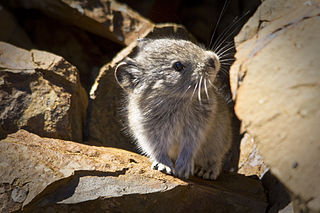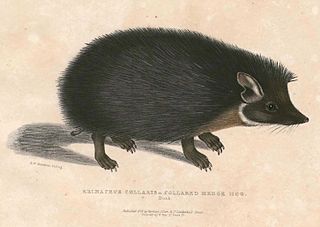
The ring-necked duck is a diving duck from North America commonly found in freshwater ponds and lakes. The scientific name is derived from Greek aithuia, an unidentified seabird mentioned by authors including Hesychius and Aristotle, and Latin collaris, "of the neck" from collum, "neck".

The collared trogon is a near passerine bird in family Trogonidae, the quetzals and trogons. It is found in Mexico, throughout Central America, and in northern South America.

The common collared lizard, also commonly called eastern collared lizard, Oklahoma collared lizard, yellow-headed collared lizard, and collared lizard, is a North American species of lizard in the family Crotaphytidae. The common name "collared lizard" comes from the lizard's distinct coloration, which includes bands of black around the neck and shoulders that look like a collar. Males can be very colorful, with blue green bodies, yellow stripes on the tail and back, and yellow orange throats. There are five recognized subspecies.

True lemurs, also known as brown lemurs, are the lemurs in genus Eulemur. They are medium-sized primates that live exclusively on Madagascar.

The collared pika is a species of mammal in the pika family, Ochotonidae, and part of the order Lagomorpha, which comprises rabbits, hares, and pikas. It is a small alpine lagomorph that lives in boulder fields of central and southern Alaska (U.S.), and in parts of Canada, including northern British Columbia, Yukon, and western parts of the Northwest Territories. It is closely related to the American pika, but it is a monotypic form containing no recognized subspecies. It is asocial, does not hibernate, and spends a large part of its time in the summer collecting vegetation that is stored under rocks ("haypiles") as a supply of food for the winter. Some individuals have been observed collecting and consuming dead birds as sources of fat and protein. Thousands of trips are made during July and August to collect vegetation for winter.

The Indian long-eared hedgehog is a small species of mammal native to northern India and Pakistan. It is insectivorous and nocturnal.

The greater hog badger is a very large terrestrial mustelid native to Southeast Asia. It is listed as Vulnerable in the IUCN Red List of Threatened Species because the global population is thought to be declining due to high levels of poaching.

Lamiinae, commonly called flat-faced longhorns, are a subfamily of the longhorn beetle family (Cerambycidae). The subfamily includes over 750 genera, rivaled in diversity within the family only by the subfamily Cerambycinae.

The semicollared hawk is a rare bird of prey species in the family Accipitridae. It is found in Colombia, Ecuador, Peru, and Venezuela. Its natural habitat is subtropical or tropical moist montane forests. It is potentially being affected by habitat loss.

The collared lark or collared bushlark is a species of lark in the family Alaudidae found in East Africa.

The collared brown lemur, also known as the red-collared brown lemur or red-collared lemur, is a medium-sized strepsirrhine primate and one of twelve species of brown lemur in the family Lemuridae. It is only found in south-eastern Madagascar. Like most species of lemur, it is arboreal, moving quadrupedally and occasionally leaping from tree to tree. Like other brown lemurs, this species is cathemeral, lives in social groups, primarily eats fruit, exhibits sexual dichromatism, and does not demonstrate female dominance. The species is listed as Endangered by the International Union for Conservation of Nature (IUCN) and is threatened primarily by habitat loss.

Cerambycinae is a subfamily of the longhorn beetle family (Cerambycidae). The subfamily has a world-wide distribution including: Asia, Europe and the Americas. Within the family, the only subfamily of comparable diversity is the Lamiinae.

Siphonogorgia is a genus of soft corals in the family Nidaliidae. Like other members of this family, these corals do not contain symbiotic zooxanthellae.
Xenoleini is a tribe of longhorn beetles of the subfamily Lamiinae. It was described by Lacordaire in 1869.
Xenolea is a genus of longhorn beetles of the subfamily Lamiinae, containing the following species:
Xenolea tomentosa is a species of beetle in the family Cerambycidae. It was described by Francis Polkinghorne Pascoe in 1864. It is known from Singapore, Malaysia, Andaman Islands, and Sumatra.

Bathythrix is a genus of ichneumon wasps in the family Ichneumonidae. There are at least 60 described species in Bathythrix.

Hog badgers are three species of mustelid in the genus Arctonyx. They represent one of the two genera in the subfamily Melinae, alongside the true badgers.

The northern hog badger is a species of mustelid native to South and East Asia.
The Sumatran hog badger is a species of mustelid endemic to the island of Sumatra in Indonesia.














